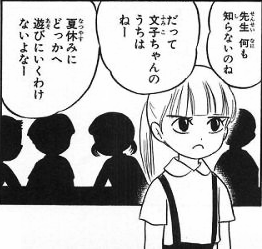|
Magic Pencil
This is an old, one-shot manga by Fukuyama Keiko about a little girl from a troubled home who finds a pencil with a note claiming the pencil will grant a wish if it's written with it... you can read it (Japanese only) here. Summary: (Thanks to holespoles for summarizing it to me, as I could only read very little of it!) The story begins with the little girl being scolded by her unsympathetic teacher. She think about how the situation in her home never changes. The other kids make rude comments about her home. After seeing a little boy she calls Shin-chan hurriedly leave the otherwise empty classroom, she finds a small pencil on the desk with a note, claiming the pencil is magic and will grant a wish. She said it looked stupid, saying there couldn't possibly be anything like that in the world! 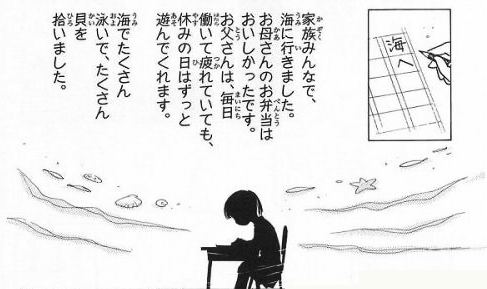 Feeling hopeful, she goes home, and asks her father carefully, if they can go to the beach. He just makes a gruff, confused sound at her. She explains they never really go anywhere, so... She is an adult now and those memories played in her mind like a dream. Waking up in the train, with the grown-up Shin-chan and their own child, they are on a trip to the sea... it is at this point that she realizes and says, while tearing up, that the pencil really WAS magic, it was just 15 years slow! 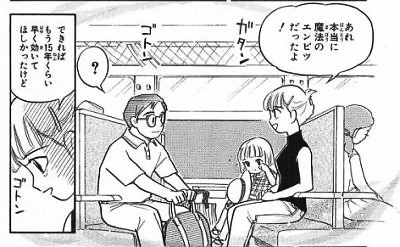 At this, Shin-chan laughs and reveals he was the one who left the pencil for her and she chides him, calling him mean/awful for keeping it a secret all this time! Author: The mangaka is Fukuyama Keiko, who was born in Tokyo in 1961. She also illustrates children's books and Pokemon fans might recognize her from the heartfelt and nostalgic illustrations that made up the ending credits of the first Pikachu pre-movie short (Pikachu's Summer Vacation). She has also illustrated some trading cards! 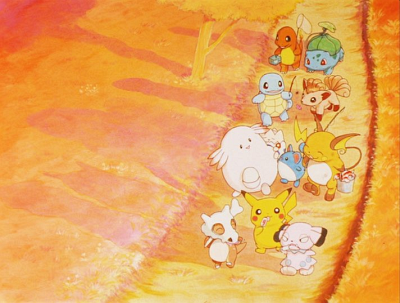 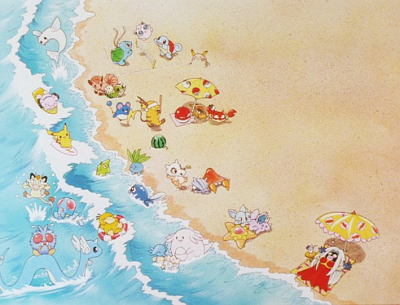
What I love so much about these works is that, aside from the little character stories happening wherever your gaze falls, is the innocently sincere way it depicts everyone simply living, playing, getting into scrapes... they're not staring at the viewer and striking a pose, they're simply living genuinely and it gives her art a more sincere cuteness that doesn't feel overdone or contrived. Tezuka fans might recognize her as the artist behind the Melmo-chan manga, a reboot of Osamu Tezuka's Marvelous Melmo, utilizing the Tezuka Star System even more than the original, filling the story with familiar faces like Sharaku, Black Jack, Hyakkimaru, and Leo/Kimba! Themes and Significance: You might ask why I dedicated a whole page to this little one-shot, is it just because it's short and untranslated, or is the subject matter? A bit of both, really, but there's also something more... this work's innocent and gentle narrative about a difficult subject, making it accessible to readers of any age, is precisely what I admire so much in the works of Osamu Tezuka and why I reread Antoine de Saint-Exupery's The Little Prince more than any other book of fiction, always appreciating a different pearl of truth... a story that can convey truths about the world to readers or viewers of all ages, that can convey harsh realities, while also giving people hope, is invaluable and what I aspire to write and draw myself. There was an Osamu Tezuka quote that advised to first show children reality, then speak to them of ideals. It might partially be due to my background, but I never liked the idea of lying to children (setting them up for inevitable disappointment in the future!) or coddling them against the realities of life—Arabs and Muslims in particular are keenly aware of death and consider this life transitory, a place where we endure trials and seek to improve ourselves and give to those in need, we're commanded to be true and uphold justice, even against ourselves and those we love if they're in the wrong—while knowing this world and we, ourselves, are flawed by design and can never be perfect, nor are we meant to last forever. It's why our children's programs never censor death or treat the topic like it's taboo! There are sad things in life and there is also evil in the world, like tyranny, abuse, prejudice... but if we can convey those things in a gentle, age-appropriate way (I certainly don't recommend unleashing full details of all the world's horrors on an innocent child!), a story can also give them hope and teach them how to cope with these things. After all, there ARE children for whom these awful things are part of their reality, so I do not think dark subject matters should be treated as inherently "adult," there are ways to discuss them, more frankly in adult works, and more carefully in works meant to be approached by all ages, that way, we do not alienate those children and give them stories that make them feel less alone, help them name what is happening to them, and that show them that life is worth living and that their present circumstances aren't forever. ♥ |
